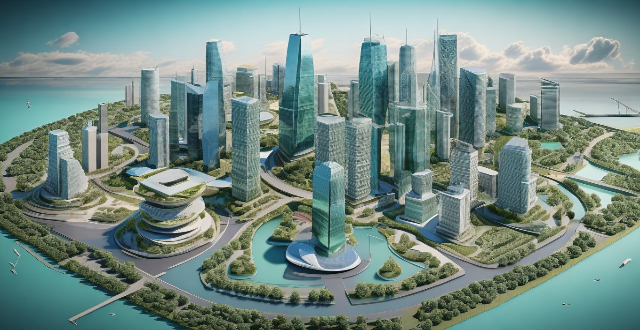Sustainable development is a key factor in shaping future cities, aiming to meet current needs without compromising those of future generations. It involves creating environmentally friendly, socially equitable, and economically viable urban areas. Environmental sustainability focuses on green spaces, renewable energy, and efficient transportation. Social sustainability promotes inclusivity, diversity, and well-being through mixed-use development, public spaces, and affordable housing. Economic sustainability aims for prosperity with minimal environmental impact by supporting local businesses, job training, and infrastructure investment. By integrating these principles into urban planning, we can create resilient and adaptable cities for the future.

The Role of Sustainable Development in Future Cities
Sustainable development is a crucial factor that will shape the creation of future cities. It refers to the process of meeting the needs of the present without compromising the ability of future generations to meet their own needs. In the context of urban planning and development, sustainable development involves creating cities that are environmentally friendly, socially equitable, and economically viable.
Environmental Sustainability
Environmental sustainability is a key aspect of sustainable development in future cities. This involves reducing the negative impact of urbanization on the environment by promoting green spaces, renewable energy sources, and efficient transportation systems. Some specific measures include:
- Green Roofs and Walls: Installing vegetation on rooftops and walls to reduce heat island effect, improve air quality, and manage stormwater runoff.
- Renewable Energy Sources: Incorporating solar panels, wind turbines, and other renewable energy sources into city infrastructure to reduce reliance on fossil fuels.
- Efficient Transportation Systems: Developing public transportation networks, bike lanes, and pedestrian-friendly streets to reduce congestion and air pollution.
Social Sustainability
Social sustainability focuses on creating cities that are inclusive, diverse, and promote well-being for all residents. This includes providing access to affordable housing, healthcare, education, and cultural amenities. Some strategies for achieving social sustainability include:
- Mixed-Use Development: Designing neighborhoods with a mix of residential, commercial, and recreational spaces to create vibrant communities and reduce the need for long commutes.
- Public Spaces: Providing parks, community centers, and other public spaces where people can gather, connect, and engage in leisure activities.
- Affordable Housing: Ensuring that there is a range of housing options available to people from different income levels.
Economic Sustainability
Economic sustainability involves creating cities that are economically prosperous while minimizing their impact on the environment. This includes fostering local businesses, promoting job growth, and investing in infrastructure that supports long-term economic growth. Some strategies for achieving economic sustainability include:
- Local Business Support: Providing resources and incentives for small businesses to thrive within the city.
- Job Training Programs: Offering training programs to help residents develop skills needed for emerging industries and job opportunities.
- Infrastructure Investment: Investing in infrastructure projects such as public transportation, broadband internet access, and renewable energy sources that support long-term economic growth.
In conclusion, sustainable development will play a significant role in shaping future cities by promoting environmentally friendly practices, social equity, and economic viability. By incorporating these principles into urban planning and development, we can create cities that are not only livable but also resilient and adaptable to changing circumstances.